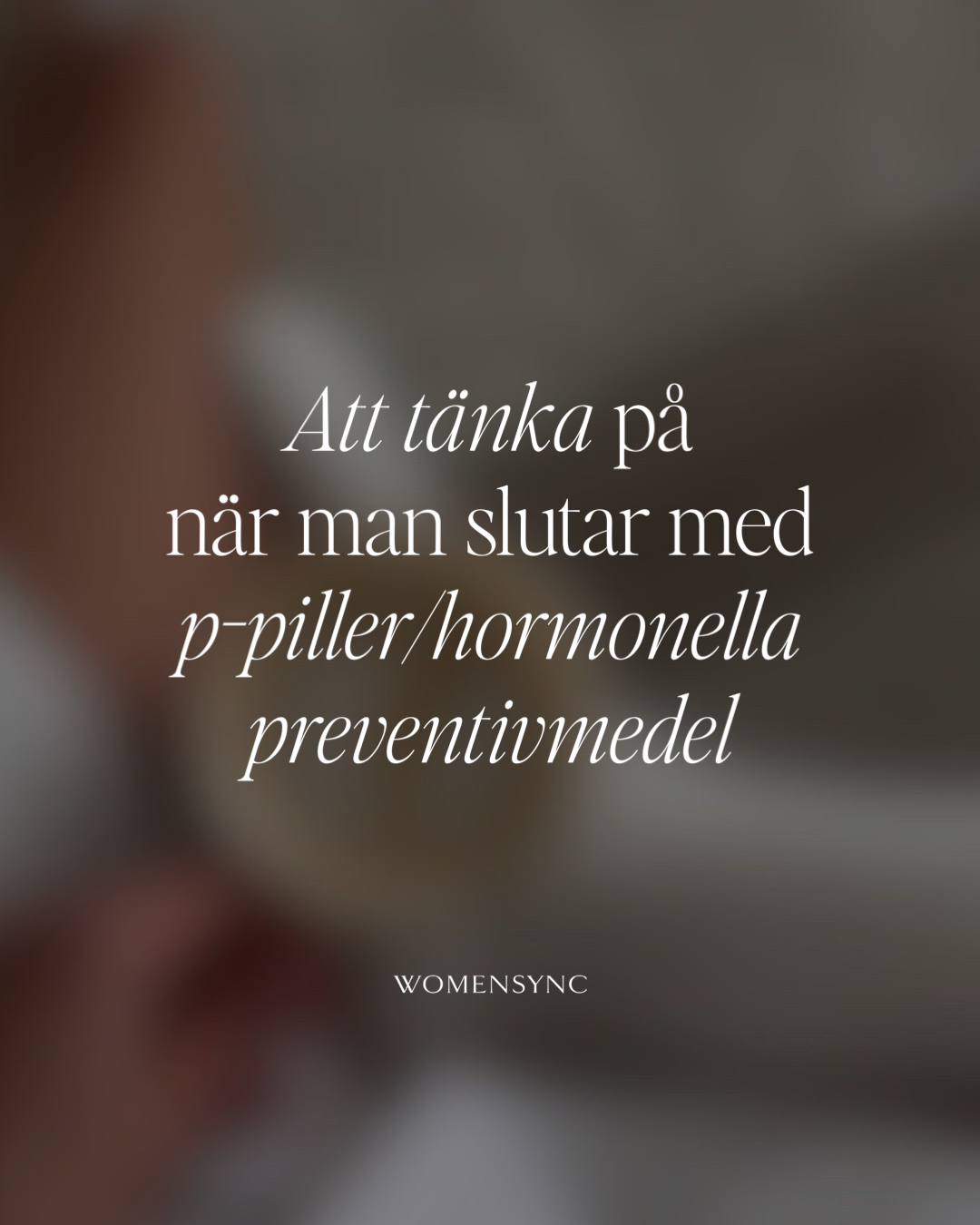Are you considering discontinuing birth control pills or other hormonal contraceptives like the birth control stick, patch, or hormonal coil? Alternatively, have you recently quit and wish to learn more about the body's response? This guide outlines essential considerations for stopping hormonal contraceptives, typical experiences post-discontinuation, and practical steps to facilitate a smooth transition.
How do birth control pills work?
One of the most common hormonal contraceptives that many are introduced to in their teens is the pill. For many it was to avoid getting pregnant, for others to suppress various period-related symptoms and diagnoses such as endometriosis , severe period pain or acne.
Birth control pills consist of the two different synthetic hormones estrogen and progestin. The composition means that your own ovulation is shut down, and that you therefore do not get a "real" period. The body's own hormonal menstrual cycle is blocked and the bleeding that can occur in connection with taking sugar pills or skipping the tablets for a few days is therefore not your natural period, but a so-called withdrawal bleeding.
What are the potential outcomes after discontinuing birth control pills or other hormonal contraceptives?
Maybe you are one of those who get their period back right away - great! For others, it can sometimes take several months, up to a year. It can feel frustrating, but it is completely normal not to get your period back right away. Another common symptom can be acne or the appearance of a nutritional deficiency.
Missed period after discontinuing birth control pills?
Many people who stop using birth control pills or other hormonal contraceptives experience that their periods do not return immediately and this is nothing unusual or dangerous. The menstrual cycle is a complex system that needs time to find its way back to its natural rhythm. If you haven't gotten your period back after 6 months, the guidelines are usually to contact a women's clinic. There are also things you can do to support your body to get your ovulation back and thus a balanced cycle. Give your menstrual cycle the time it needs to recover after using the pill, make sure to give yourself some extra care in the meantime, and seek help if you don not see a change after a while.
Acne after discontinuing birth control pills?
Another scenario that can occur after stopping hormonal contraceptives is so-called "post-pill-acne". If you had acne before taking birth control pills, birth control pills can sometimes reduce acne. This is because birth control pills reduce the skin's sebum production while suppressing testosterone (androgens). So when you stop taking birth control pills, the hormones can instead shoot through the roof and a consequence of this can be that sebum production begins to be overproduced, which can lead to acne. Most people experience the most discomfort about 6 months after stopping the pills and then slowly get better. Usually, the menstrual cycle and hormones regulate themselves within 1-2 years. That it takes time can be frustrating, but if you give the body what it needs, it will eventually heal. Be patient and be consistent!
Nutritional deficiencies after discontinuing birth control pills
It is not uncommon that after stopping hormonal contraceptives, you may experience various menstrual-related symptoms linked to nutritional deficiencies. These nutritional deficiencies often concern vitamins and minerals such as folate, B12, B6, B2, vitamin C, vitamin E, magnesium, zinc and selenium. All of these are important for a healthy and functioning menstrual cycle. Hormonal contraceptives can sometimes feel like a quick solution to a lasting problem such as acne or period-related problems. What this quick fix can often mean is that you suppress the symptoms instead of getting to the bottom of the real cause.
Are hormonal contraceptives good or bad?
When it comes to using hormonal birth control or not, there is no right or wrong, it's all about finding a method that suits you and your body. We want women to have the knowledge and understanding of the body and how the various methods work in order to make an active and informed choice. For some, hormonal birth control works well and the option of not using any form of hormonal birth control can create more stress than not doing it (and we know how stress affects our hormones and menstrual cycle). For others, side effects of various kinds can mean that hormonal contraceptives do not work well at all.
It is important to distinguish between using hormonal contraception to avoid pregnancy and using it as a way to alleviate various symptoms such as acne or menstrual problems. Because when you experience discomfort, it is in most cases symptoms of something not being completely balanced. In those cases, you can instead try to find the fundamental reason why you are experiencing the symptoms, as hormonal contraceptives really only "pause" the symptoms. In many cases, there is a cause that can be cured with the right tools in your lifestyle.
There are several different methods to avoid pregnancy
It is crucial to emphasize that hormonal contraceptives are not the sole means of pregnancy prevention. By understanding our bodies, we can learn to recognize our fertile and non-fertile phases. Numerous tools and methods are available to assist in this tracking process.
Deciding whether or not to use hormonal contraceptives is not always straightforward. However, with sufficient understanding of the available options and their functionalities, you can make an informed decision to select the method that best aligns with your preferences and needs.
This is how you regain your period back after discontinuing birth control pills
Experiencing a missed period or post-pill acne does not indicate a problem with your menstrual cycle or hormones; rather, it can be viewed as a delayed side effect. There are several self-care measures you can take to support ovulation and create optimal conditions for a healthy menstrual cycle:
- For the thyroid gland and menstrual cycle to function optimally, it is important to avoid nutritional deficiencies, especially in vitamin D and magnesium (and zinc to combat acne). You can not build a house without wood! If you suspect you have a nutritional deficiency, get examined and enrich your diet with a variety of nutritious foods.
- Balance your blood sugar through diet. The body needs proteins and fats as essential components to produce sex hormones. Starting your day with a substantial breakfast rich in protein and fat helps stabilize your blood sugar, keeping you full longer and promoting a safe environment for ovulation.
- Manage stress with sufficient sleep, proper nutrition and rest. Find activities that help you unwind, such as reading, taking a forest walk, or listening to music.
- Be patient and consistent while being kind to yourself. The results are coming!
Source list
Basu, BR, Chowdhury, O., & Saha, SK (2018). Possible link between stress-related factors and altered body composition in women with polycystic ovarian syndrome. Journal of human reproductive sciences , 11 (1), 10.
Irani, M., & Merhi, Z. (2014). Role of vitamin D in ovarian physiology and its implication in reproduction: A systematic review. Fertility and sterility , 102 (2), 460-468
Palmery, M., Saraceno, A., Vaiarelli, A., & Carlomagno, G. (2013). Oral contraceptives and changes in nutritional requirements. European review for medical and pharmacological sciences , 17 (13), 1804–1813.
Takaya, J., Higashino, H., & Kobayashi, Y. (2004). Intracellular magnesium and insulin resistance. Magnesium Research , 17 (2), 126–136.
Verma, KC, Saini, AS, & Dhamija, SK (1980). Oral zinc sulphate therapy in acne vulgaris: A double-blind trial. Acta dermato-venereologica , 60 (4), 337-340.

